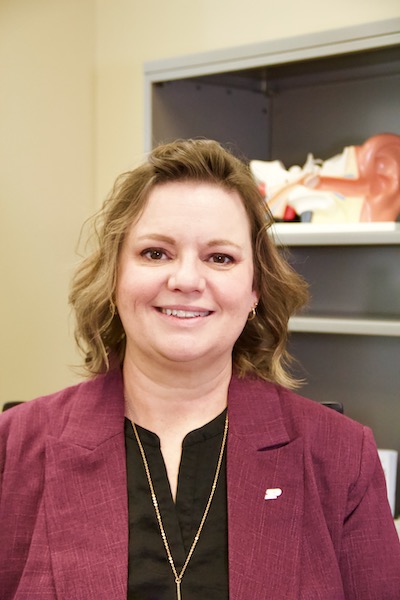Purdue clinician: Hearing loss leads to more falls for older adults
Written by: Tim Brouk, tbrouk@purdue.edu

Melissa NewellPhoto by Tim Brouk
Getting your hearing checked now could help you stay more upright later.
Melissa Newell, a clinical assistant professor in the Purdue University Department of Speech, Language, and Hearing Sciences, said adults with hearing loss may fall more due to poorer spatial awareness and declining inner ear function. This problem is especially true for adults suffering from declining cognition.
“We know it takes cognitive effort to maintain balance,” Newell explained. “When patients have hearing loss, their cognitive allotment is going toward their hearing, leaving them less cognitive effort for walking and moving around in their environment.”
Falls account for the most injuries and deaths in older adults, according to recent studies.
The combination of hearing loss and increased fall risk also contributes to a social decline in patients. Newell has observed older adults suffering from hearing loss become self-isolated. They withdraw from activities they once enjoyed. They talk less, and those who have fallen before will reduce how often they walk, often leading to further cognitive decline.
This link of hearing loss with dizziness can be a red flag for cognitive — and overall health — decline in patients. Older people may decide to walk less due to a previous fall. This may reduce the number of falls they have, but it also makes them weaker physically.
Hearing aids can help not only with the patient’s hearing but can provide improved spatial awareness while increasing cognitive allotment for balance. Recent studies have backed this: The National Institutes of Health published findings of even just mild hearing loss — a 25-decibel drop — triples fall risk in adults ages 40-69. The research continued that this is the age range when hearing loss first presents itself and adults are less guarded about falling.
Another study examined medical records of 115,000 senior citizens diagnosed with hearing loss. Researchers discovered 5.5% more adults within the hearing loss group had falls that caused injury compared to a group of seniors with no diagnosed hearing loss. The article continued that a population of first-time hearing aid users reduced their number of falls by 13% over a three-year period compared to a group that did not invest in hearing aids.
“It’s really important to check your hearing if you’re having concerns about your balance. The ear controls your hearing and balance information, and when there are difficulties with both, we have patients that often fall,” Newell said. “Patients who fall are more likely to fall again. Injuries are very common after a fall and can lead to death for many of our patients.
“Treating hearing loss is very important in keeping patients functioning and doing well throughout their lives. Please reach out to your local audiologist to schedule an appointment for an assessment and to discuss treatment options.”
Purdue’s M.D. Steer Speech, Language, and Hearing Clinics specialize in conditions affecting speech, language, voice, swallowing, balance and hearing. The clinics offer testing and treatments. Learn more about the clinics.
Discover more from News | College of Health and Human Sciences
Subscribe to get the latest posts sent to your email.